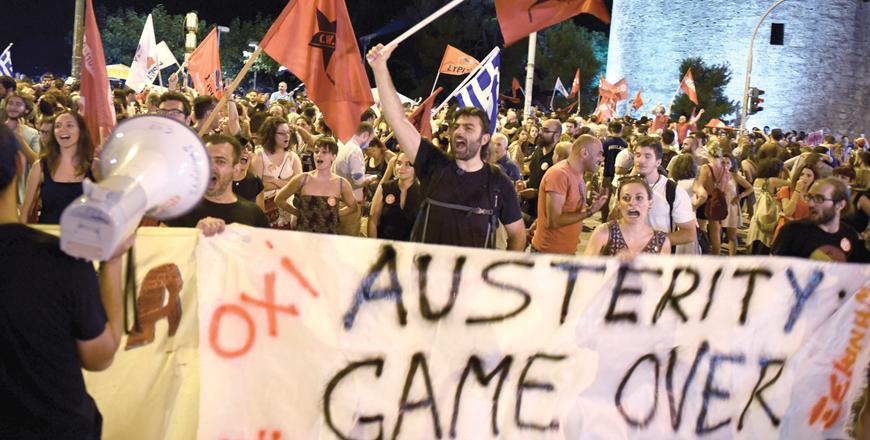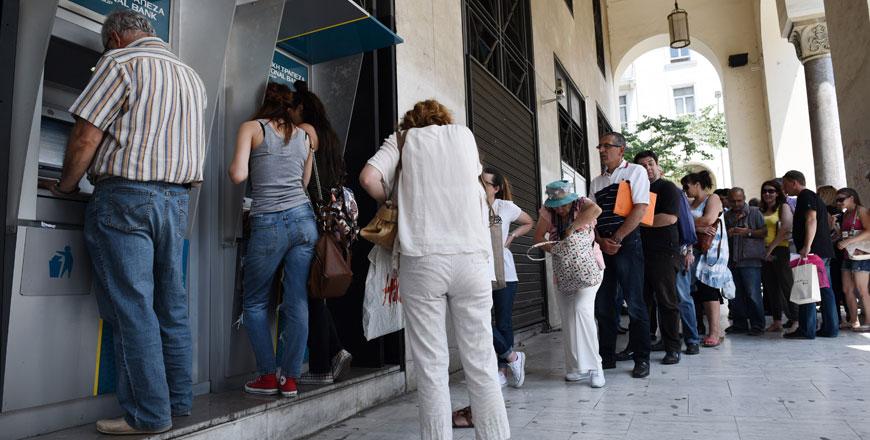You are here
Germany dismisses Greece bid for new bailout after ‘no’ vote
By AFP - Jul 07,2015 - Last updated at Jul 07,2015

Supporters of the ‘no’ vote celebrate after the results of the referendum in the northern Greek port city of Thessaloniki, Sunday (AP photo)
ATHENS — Germany on Monday dismissed Greece's bid to clinch a quick new debt deal after the country delivered a resounding "no" to more austerity, appearing little moved by the surprise resignation of the Greek finance minister.
Yanis Varoufakis, who had irritated his European counterparts with his blunt negotiating style, announced he was resigning at Prime Minister Alexis Tsipras' request in a move to placate creditors.
His departure came a day after Greek voters overwhelmingly rejected more austerity required by international creditors under a bailout deal, heightening fears of a "Grexit".
But Berlin said the departure of Varoufakis did not change anything.
"It is not about people but rather positions," Chancellor Angela Merkel's spokesperson Steffen Seibert said, adding that there is currently "no basis to enter into negotiations on a new aid programme".
"It is up to Greece" if it wants to stay in the eurozone, he said. "We are waiting to see which proposals the Greek government makes to its European partners."
A Greek government source said Tsipras and Merkel had spoken by telephone and agreed that Athens' proposals would be presented at a hastily called eurozone summit on Tuesday.
Berlin's reluctance to reopen negotiations underlined a sharp divide within Europe over the Greek crisis, with France, Italy and Spain adopting a more conciliatory tone.
Italian Prime Minister Matteo Renzi said on his Facebook page that Europe needs to "talk not only about austerity and balance sheets but about growth, infrastructure", while Spain said it was open to new negotiations for a new Greek bailout.
And although last week Greece defaulted on a 1.5 billion euro repayment to the IMF, effectively cutting them off from further financial assistance, the fund's chief Christine Lagarde said the global crisis lender was "monitoring the situation" and stood "ready to assist Greece if requested to do so".
Merkel was set to meet with French President Francois Hollande in Paris and the encounter could set the tone for Tuesday's summit, called to examine the impact of Sunday's referendum.
As eurozone leaders weighed the cost of the vote, Tsipras also spoke to Russian President Vladimir Putin by telephone as Athens scrambled to restore liquidity to its battered banking system.
After jubilant celebrations by "no" voters following their 61 per cent referendum victory, Greeks returned to the reality of queuing at ATMs for their daily withdrawal limit of 60 euros.
Fears were growing that the cash machines could soon run out despite government-enforced caps on withdrawals, and emergency funding was urgently needed from the European Central Bank to stave off economic collapse.
"I'm very afraid we will get no cash anymore in the coming days. They really have to fix it, end of this week at the latest, otherwise it's collapsing," pharmacist Lambros Vritios said in reference to the banking system.
Vritios said he had been to several ATMs but found them empty. "It's really crushing me."
Despite its hardline approach to debt talks, Germany said eurozone leaders should discuss humanitarian aid for the austerity-fatigued country with widespread poverty and high unemployment.
"We must now cover their needs very quickly. The people there need help and we should not refuse it just because we're unhappy with the result of the referendum," German Economy Minister Sigmar Gabriel said.
Market reactions to the referendum were mostly muted, suggesting limited contagion from a possible "Grexit", or Greece's exit from the eurozone.
'Greece in limbo'
Ahead of the eurozone summit, Europe scrambled to calm fears that the "no" vote could end up splitting the bloc.
"The stability of the euro area is not in question," European Commission Vice President Valdis Dombrovskis told a press briefing. "We have everything we need to manage the situation."
A flurry of meetings also took place Monday, with German and French finance ministers holding talks in Warsaw, while the Euro Working Group of top treasury officials was to meet in Brussels.
More than three-quarters of Greeks want to stay in the eurozone, according to surveys. But analysts are now putting the chances of a Grexit at "very high".
"Did Tsipras celebrate a Pyrrhic 'no'?" asked Carsten Brzeski, chief economist at ING-DiBa bank.
"Lots of bad blood is on the floors. Greek banks are closed and Greece does not have a bailout programme," he noted.
Holger Schmieding, analyst at Berenberg bank, also warned that the change in finance minister may be "more symbolic than a change of substance" as Varoufakis has not been leading the negotiations since April.
"Greece is in limbo until further notice, sliding towards Grexit unless Athens changes course," he said.
Tsipras, 40, insists that instead of Grexit, the creditors will now finally have to talk about restructuring Greece's massive 240 billion euro ($267 billion) debt to them.
The last EU-IMF bailout for Greece ran out last Tuesday, despite Tsipras's appeals for it to be extended.
Greece was officially declared in default on Friday by the European Financial Stability Facility, which holds 144.6 billion euros ($160 billion) of Greek loans.
Related Articles
ATHENS — After jubilant celebrations by 'No' voters, Athens returned to a reality of ATM queues Monday and the shock news that the finance m
ATHENS — Stunned Greeks faced shuttered banks, long supermarket lines and overwhelming uncertainty on Monday as a breakdown in talks with in
Fresh tensions emerged Thursday between Greece and Germany as attention turned to Athens's huge debt pile two days after the stricken eurozone country secured an extension of its bailout.

















